Contents:
Top cybersecurity companies play a pivotal role in addressing the financial impact of cybercrime, as evidenced by Cybersecurity Ventures’ forecast that in 2025, global cybercrime damage costs will reach $9.5 trillion USD annually, $793 billion USD monthly, and $182.5 billion USD weekly.
As the need for strong security measures increases, the cybersecurity technology sector has seen rapid expansion, alongside a surge in available solutions.
To guide you through this expanding market, we’ve identified 10 top cybersecurity companies, along with additional noteworthy mentions.
Our recommendations are based on factors such as innovation, revenue growth, user feedback, product attributes and advantages, expert analysis, independent security evaluations, and practical applications.
Top Cybersecurity Companies
The listed top cybersecurity companies are experts in forecasting, mitigating, and neutralizing cyber threats, allowing their clients—and their clients’ customers—to concentrate more on proactive measures instead of defensive strategies.
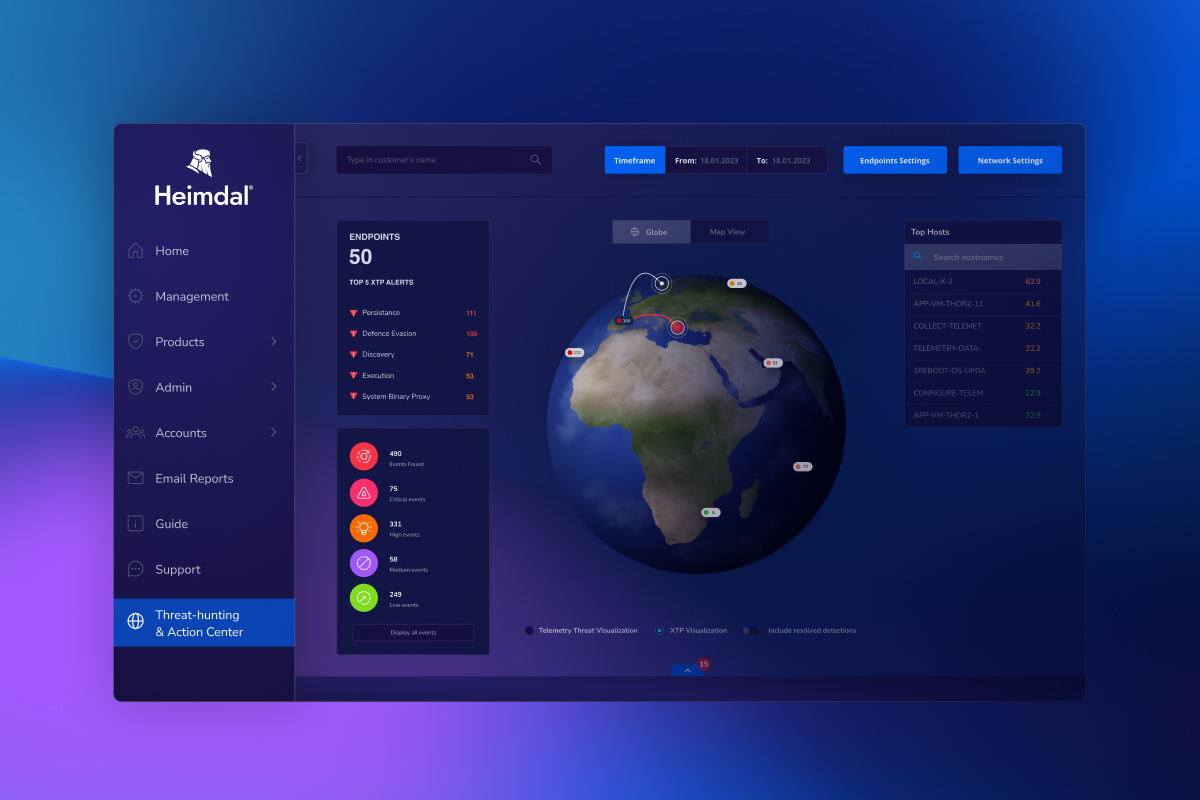
About: Founded in 2014 and headquartered in Denmark, Heimdal has quickly become a global player in the cybersecurity industry, serving customers across various sectors, including finance, healthcare, education, and government. Named after the Norse god Heimdal, who was known for his vigilance and ability to foresee threats, as a cybersecurity platform, Heimdal reflects its namesake by focusing on advanced threat detection and prevention.
Cybersecurity Product Categories:
- Threat Prevention
- Endpoint Detection & Response
- Threat Intelligence
- Ransomware Encryption Protection
- Privileged Access Management
- Vulnerability Management
- Unified Threat Platform
- Next-Generation Antivirus
- Extended Detection & Response (XDR)
- Managed Extended Detection & Response (MXDR)
- Compliance Management
- Application Control
- Identity & Access Management.
Best for:
- Threat Prevention (DNS Security & Patch Management);
- Endpoint Protection;
- Managed Extended Detection & Response (MXDR).
Overall Gartner Peer Insights Score: 4.7
Customer Review:
One of the best end point solutions in the market. Very few endpoints that do DNS and patching very well. New features added will make it very strong on an enterprise level.
Overall Glassdoor Score: 3.4
Employee Review:
Working at Heimdal provides an opportunity to be at the forefront of the industry, tackling complex cybersecurity challenges and contributing to the development of cutting-edge technologies.
2. Palo Alto Networks
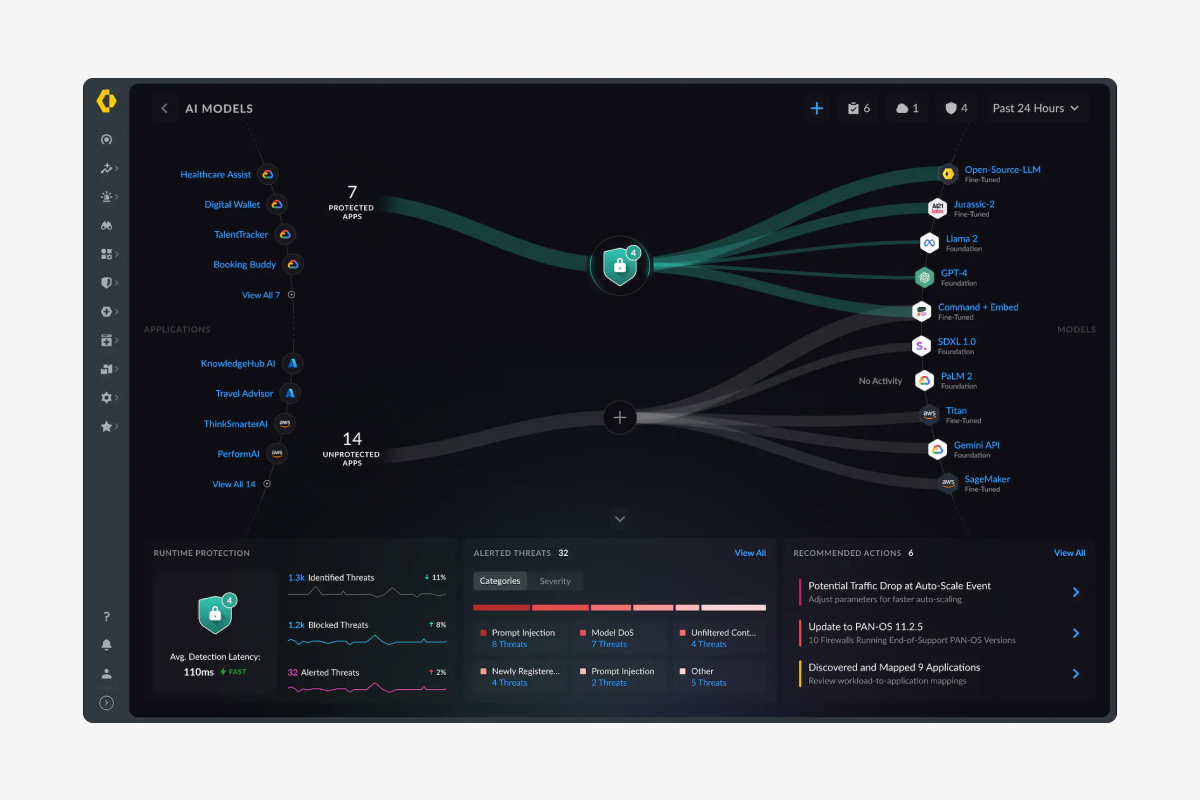
About: Palo Alto Networks is a multinational cybersecurity company founded in 2005 and based in Santa Clara, California. It offers advanced firewalls and cloud-based security solutions designed to provide comprehensive protection and prevent cyberattacks across network, cloud, and mobile environments. The company has expanded its services through various acquisitions to include endpoint protection and other security technologies.
Cybersecurity Product Categories:
- Firewall Security
- Endpoint Security
- Cloud Security
- Threat Detection
- Zero Trust Security.
Best for:
- Threat Detection and Prevention
- Network Security
- Cloud Security
- Endpoint Protection
Overall Gartner Peer Insights Score: 4.6
Customer Review:
I have personally been using Palo Alto firewalls for the past three years for our organization and its interface simplifies rules of configuration and monitoring, enhancing efficiency. Palo Alto networks robust support and comprehensive documentation are truly helpful for an Administrator.
Overall Glassdoor Score: 4
Employee Review:
Good products with lots of potential and good benefits.
3. Fortinet
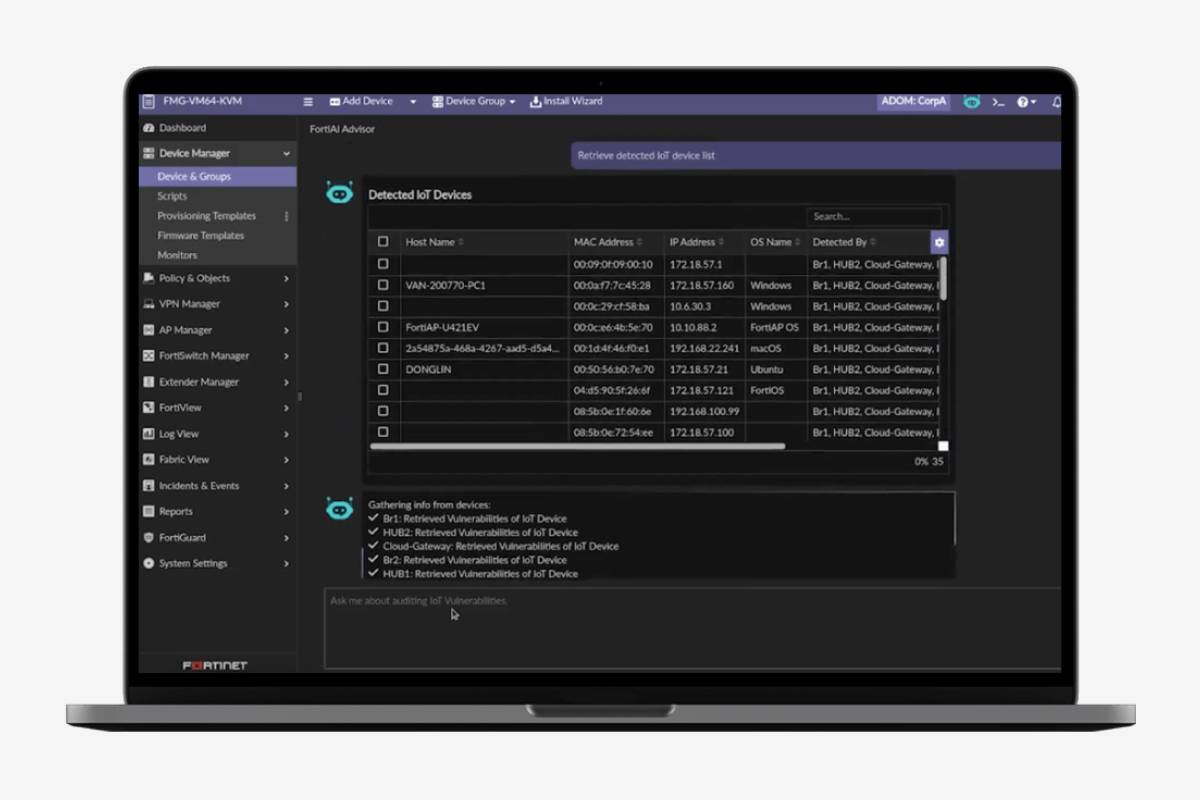
About: Fortinet, founded in 2000 by Ken Xie and Michael Xie, is a leader in the field of cybersecurity. The company’s headquarters are located in Sunnyvale, California, and it has grown significantly over the years.
Fortinet’s flagship product is its FortiGate firewall, which provides a broad array of security and networking functions.
Fortinet is also known for its FortiGuard Labs, a research team that helps keep their security systems up to date with the latest global threat intelligence information.
Cybersecurity Product Categories:
- Network Security;
- Cloud Security;
- Secure Access and SD-WAN;
- Endpoint Security;
- Security Operations;
- Email Security;
- Zero Trust Access.
Best for:
- Network Security;
- Threat Intelligence (FortiGuard Labs);
- Secure SD-WAN;
- Cost effectiveness (particularly attractive for medium-sized businesses).
Overall Gartner Peer Insights Score: 4.7
Customer Review
The uptime on the FortiGate has been impressive. I generally only have to reboot it for firmware updates. Their technical support can be good as long as you get escalated to Tier 2.
Overall Glassdoor Score: 4
Employee Review:
Decent work-life balance and flexible work environment.
4. IBM Security
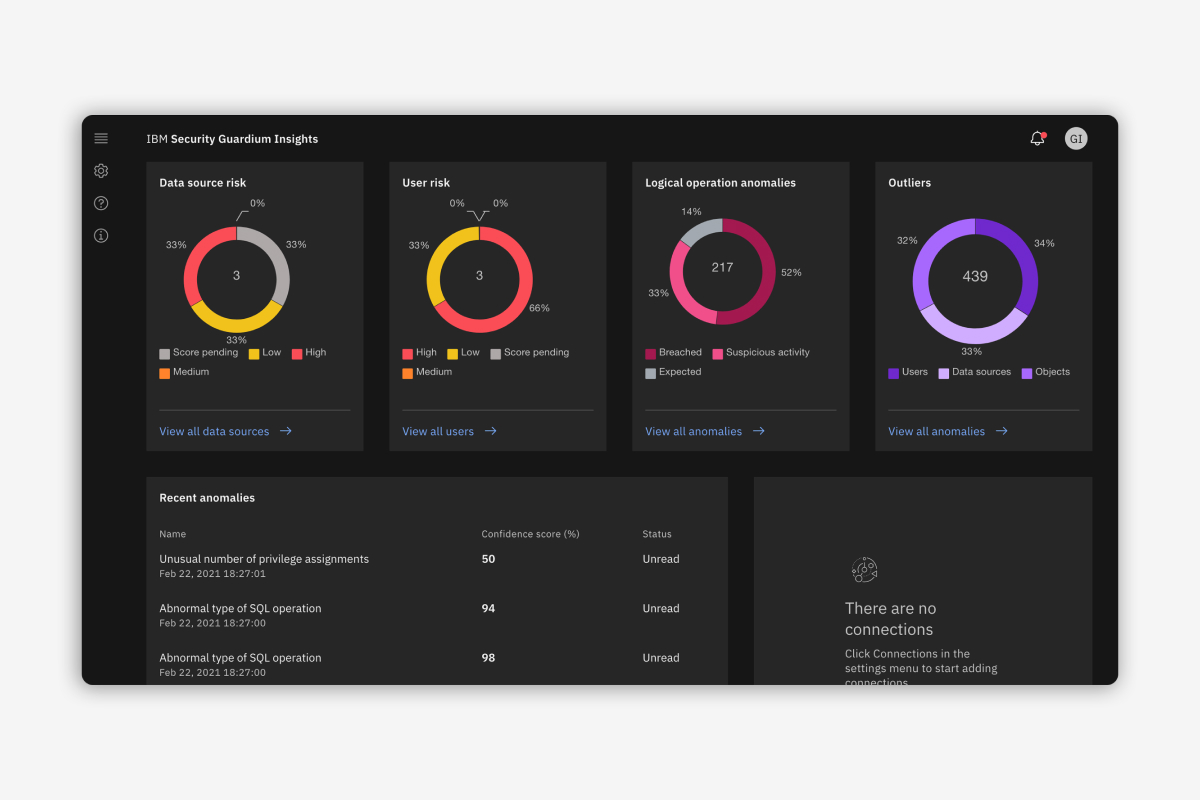
About: IBM Security is a division of IBM, one of the largest technology and consulting employers in the world, dedicated to providing security solutions and services. It offers a comprehensive range of security software, services, and research in areas like cloud and data security, endpoint protection, identity and access management, and mobile security.
Cybersecurity Product Categories:
- Endpoint Security;
- Network Security;
- Threat Intelligence & Response;
- Identity & Access Management;
- Cloud Security;
- Data Security.
Best for:
- Enterprise Security Management;
- Identity & Access Management;
- Managed Security Services.
Overall Gartner Peer Insights Score: 4.4
Customer Review:
The flexibility that IBM offers helps our security team deduct, recognize and prioritize hazards to the environment.
Overall Glassdoor Score: 4
Employee Review:
You have access to excellent learning opportunities, and if you invest time and effort, you will reap the benefits.
5. Cisco

About: Cisco Systems, Inc., commonly known as Cisco, is a global technology leader known for its networking and telecommunications equipment and services. Founded in 1984 by Leonard Bosack and Sandy Lerner, two computer scientists from Stanford University.
Cybersecurity Product Categories:
- Network Security;
- Advanced Threat Protection;
- Email Security;
- Cloud Security;
- Identity & Access Management;
- Web Security;
- Zero Trust Security.
Best for:
- Integrated Network Security;
- Cloud Solutions.
Overall Gartner Peer Insights Score: 4.5
Customer Review
Cisco’s AnyConnect Secure Mobility Client VPN application has been in use for quite a long time now in our organization. It has allowed our team to establish secure connections to any remote machine, thereby maintaining trust of our partners and customers.
Overall Glassdoor Score: 4.3
Employee review
Cutting edge technology and loads of opportunities and challenges for learning and growth.
6. Trend Micro
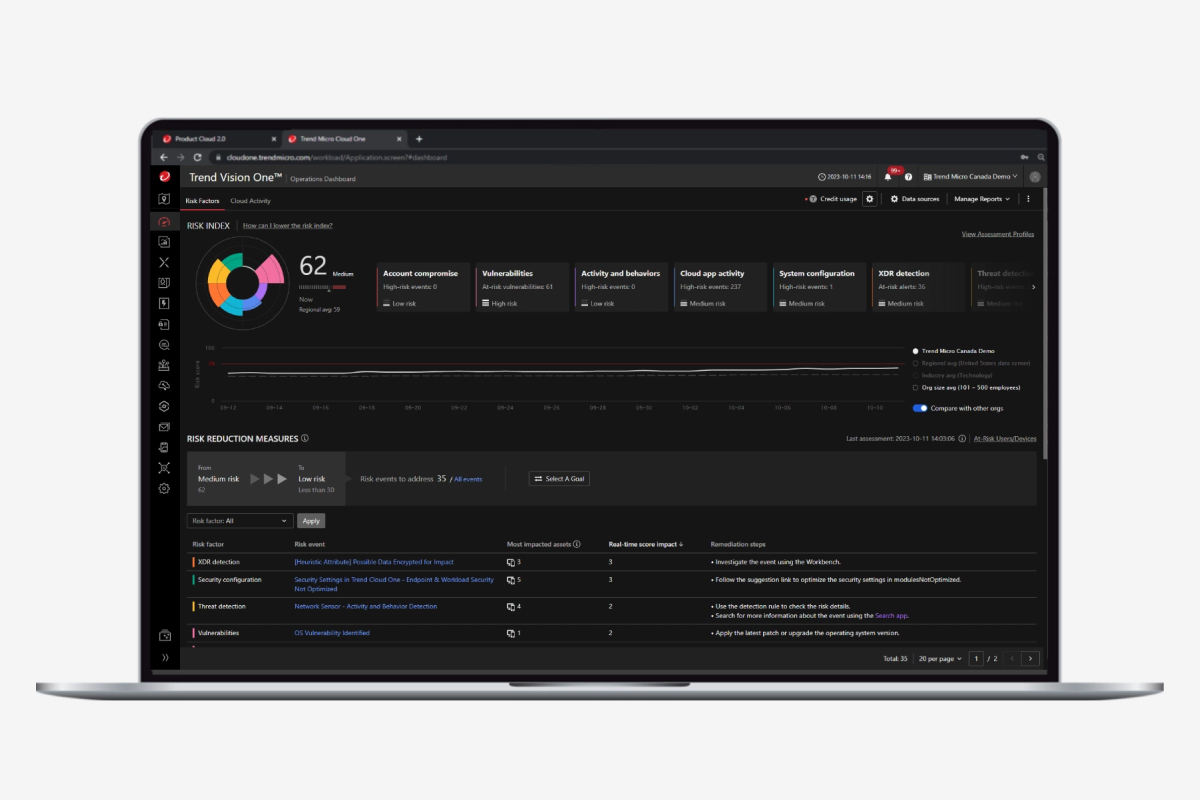
About: Trend Micro Inc. is a cyber security software company with American-Japanese roots. It operates research and development centers in 16 locations worldwide, covering every continent except Antarctica. Founded in 1988 in Los Angeles, California, the company has grown to become a significant player in the field of information security, particularly in cloud and endpoint security.
Cybersecurity Product Categories:
- Endpoint Security;
- Cloud Security;
- Hybrid Cloud Security.
Best for:
- Endpoint Security;
- Cloud Security;
- Best for the needs and budgets of small to medium-sized businesses, offering simple, effective, and scalable security solutions.
Overall Gartner Peer Insights Score: 4.7
Customer Review:
What we appreciated most about the service is its ability to correlate data across multiple security layers, including email, endpoints, servers, and networks.
Overall Glassdoor Score: 3.9
Employee Review
Company culture is one of the best out there.
7. McAfee

About: McAfee has been at the forefront of the computer security industry since its founding in 1987 by John McAfee. It specializes in developing digital security tools for personal computers, server devices, and more recently, mobile devices. McAfee’s software is geared towards preventing malware, including viruses, worms, and Trojan horses, as well as providing robust internet security features to combat online threats.
Cybersecurity Product Categories:
- Consumer Solutions;
- Enterprise Solutions;
- Identity Protection Services;
- VPN and Privacy.
Best for:
- Virus and Malware Protection;
- Internet Security;
- Identity Theft Protection;
- Performance Optimization;
- VPN Services.
Overall Gartner Peer Insights Score: 3.9
Customer Review:
McAfee had their share of ups-and-downs during ‘Intel years’, however since then, McAfee has become a very focused company, providing a very strong product.
Overall Glassdoor Score: 3.9
Employee Review
McAfee has great perks and valued employee wellness programs.
8. Darktrace
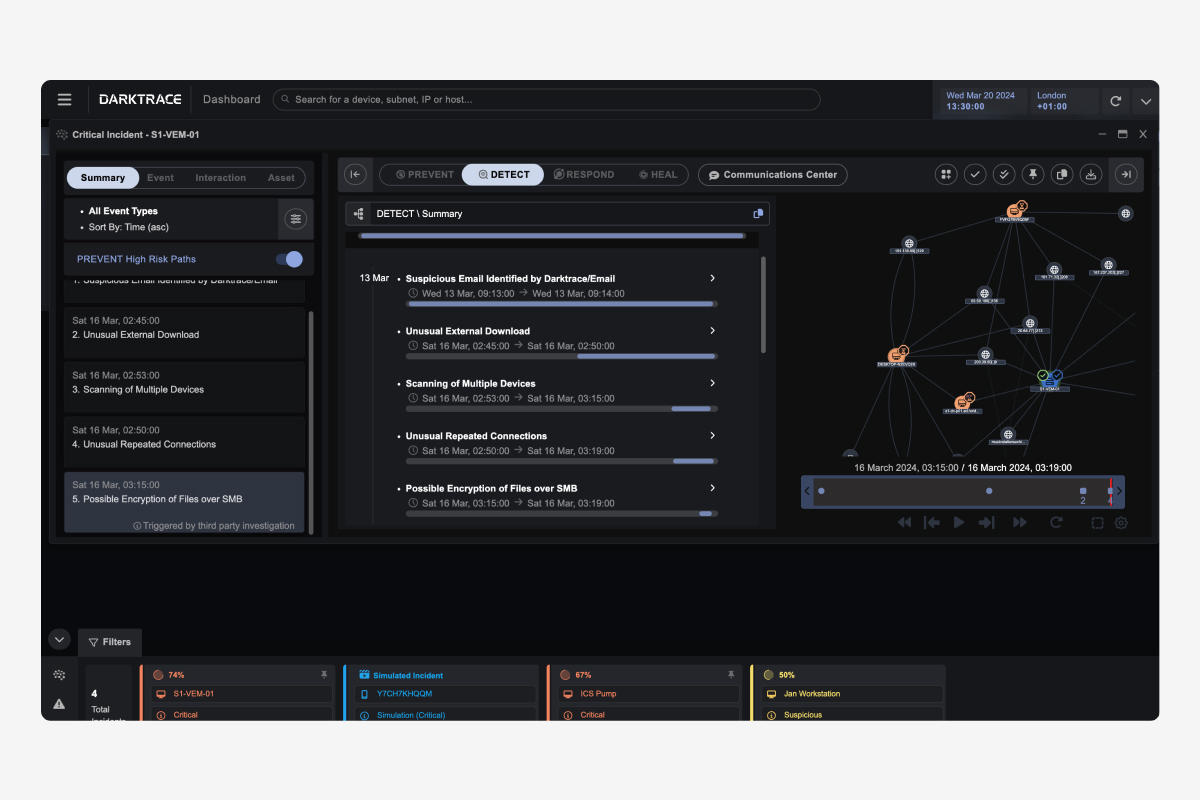
About: Founded in 2013 in Cambridge, United Kingdom, Darktrace uses machine learning and AI algorithms to detect, respond to, and prevent cyber threats across diverse digital environments, including cloud, on-premises, and hybrid networks. The core of Darktrace’s technology is its “Enterprise Immune System,” which is inspired by the human immune system.
This technology learns what normal behavior looks like within a digital environment and can then identify anomalies or potential threats based on deviations from this ‘normal’ pattern.
Cybersecurity Product Categories
- Threat Detection & Response;
- Network Security;
- Email Security;
- Cloud Security.
Best for:
- AI-Powered Security;
- Autonomous Threat Detection;
- Rapid Response (via its Antigena product);
- Reduction in Alert Fatigue.
Overall Gartner Peer Insights Score: 4.7
Customer Review
Generally positive – the Darktrace team was very supportive with our roll out efforts and made it a smooth and simple activity.
Overall Glassdoor Score: 3.4
Employee Review
Having just returned to Darktrace for a second time I feel very lucky to be welcomed back with open arms.
9. Sophos
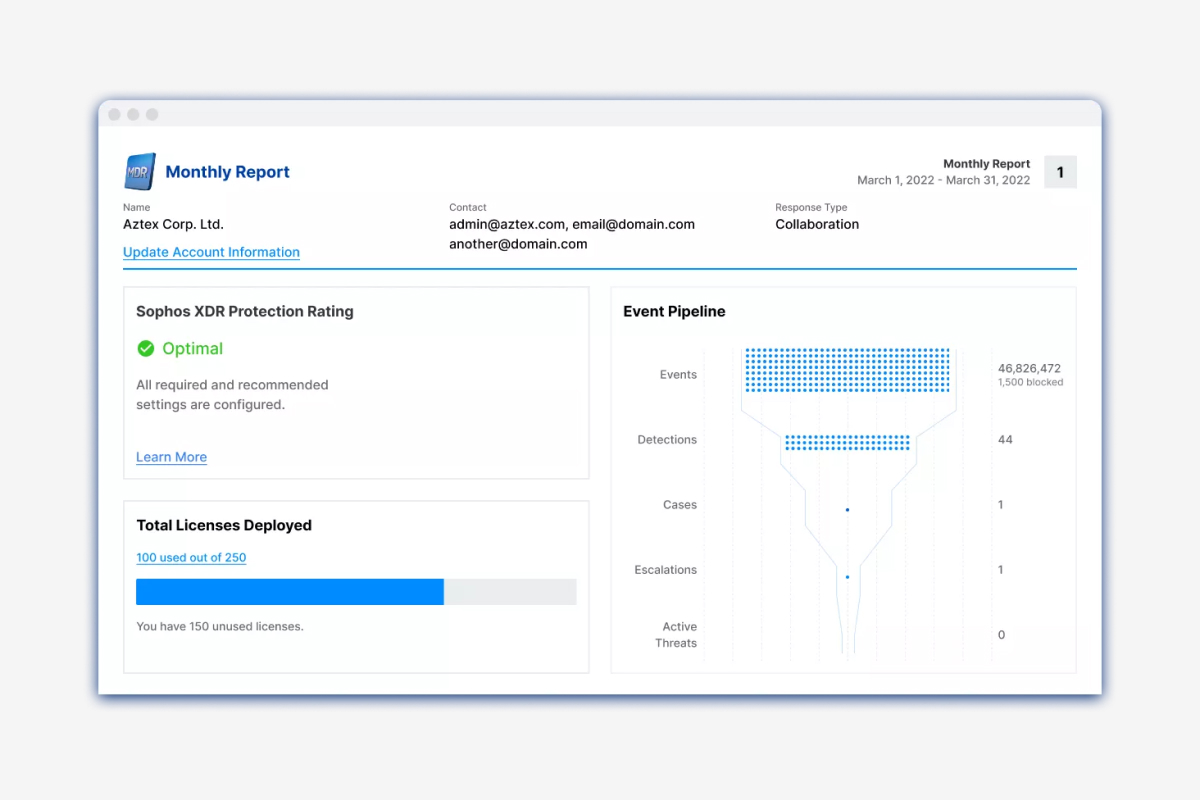
About: Founded in 1985 in Abingdon, England, Sophos has grown to become one of the leaders in the global security market, catering to both small and medium-sized businesses as well as large enterprises.
Cybersecurity Product Categories:
- Endpoint Protection;
- Network Security;
- Cloud Security;
- Email Security;
- Mobile Security;
- Endpoint Detection & Response;
- Threat Intelligence;
- Managed Threat Response;
- Phishing Protection;
- Web Security.
Best for:
- Endpoint Protection;
- Ransomware Protection;
- Managed Threat Response;
- Cloud Security; Small and Medium-Sized Businesses.
Overall Gartner Peer Insights Score: 4.8
Customer Review
Sophos MDR helped us with a compromised server and was able to prevent the bad actor from doing anything.
Overall Glassdoor Score: 3.9
Employee Review
Worked with wonderful co-workers. A chance to be remote. Flexible with time as long as I get my work done.
10. Crowdstrike
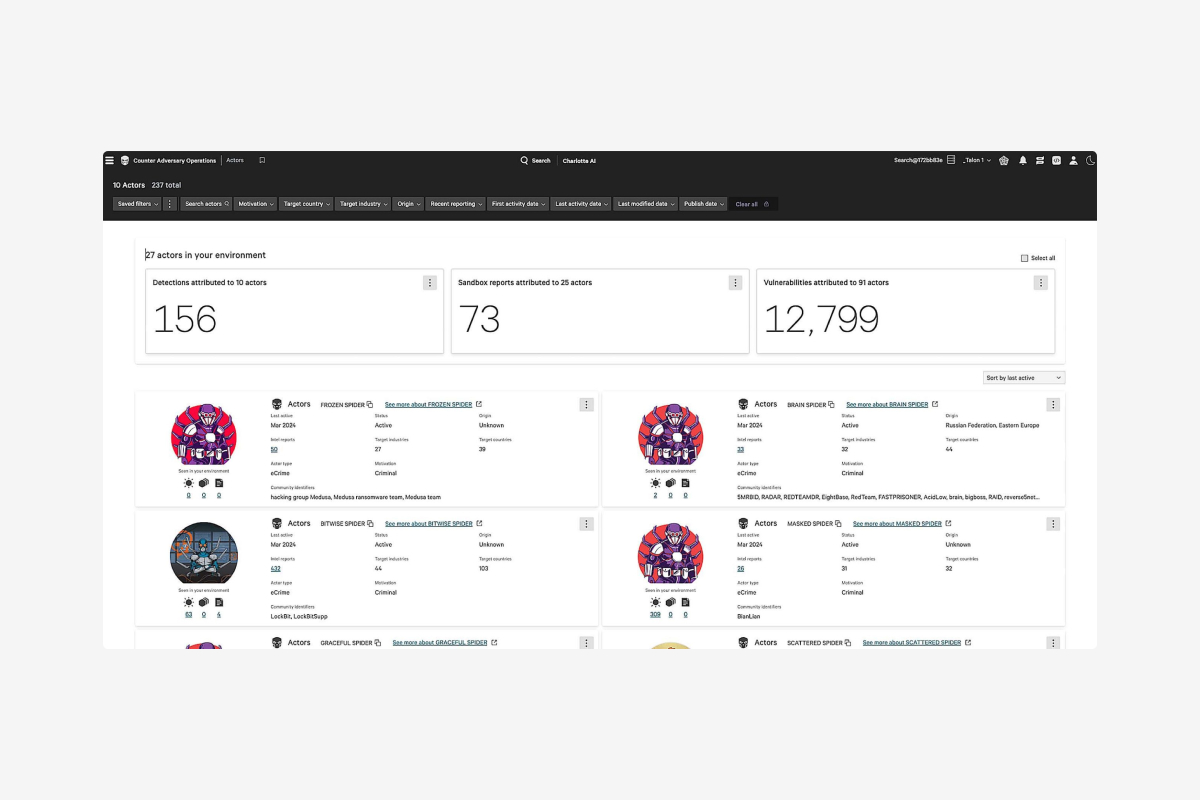
About: CrowdStrike is a top cybersecurity company that provides cloud-based endpoint protection, threat intelligence, and incident response services.
Founded in 2011 by George Kurtz, Dmitri Alperovitch, and Gregg Marston, CrowdStrike has become a leader in the cybersecurity industry, particularly known for its advanced threat detection and response capabilities.
Cybersecurity Product Categories:
- Endpoint Security;
- Threat Intelligence;
- Cloud Security;
- Identity Protection;
- Security & IT Operations;
- Managed Services;
- Security & Incident Response.
Best for:
- Advanced Endpoint Security;
- Threat Hunting & Incident Response;
- Threat Intelligence;
- Cloud Security.
Overall Gartner Peer Insights Score: 4.7
Customer Review
One of the standout features of the Falcon is its Real-Time Response (RTR) capability. RTR allows security teams to investigate and remediate threats remotely at endpoints.
Overall Glassdoor Score: 4.1
Employee Review
Great technology, innovative, and smart colleagues. CEO has good direction.
Criteria for Selecting a Cybersecurity Company
Now that you have our detailed list of top cybersecurity companies, you need to learn how to choose one according to your organization’s needs.
We’re going to explore the key criteria that should guide your decision when choosing a cybersecurity partner.
Reliability and Reputation
Top cybersecurity companies are known for their good reputation and reliability. The reliability and reputation of a cybersecurity company are paramount. A reliable cybersecurity provider should have a proven track record of effectively protecting its clients against cyber threats.
Start by researching the company’s history, including how long they have been in business, their growth trajectory, and any notable achievements or case studies. Additionally, consider the company’s reputation in the industry.
Heimdal, for example, is known for its extensive tech stack—the widest in the market—offers an illustrative example of what to look for when evaluating potential cybersecurity partners.
Its expertise across various sectors enhances its ability to tailor its broad service offerings to meet specific industry needs, which is a critical consideration for potential clients looking for a cybersecurity partner that can navigate the intricacies of their specific field.
Positive reviews, testimonials from satisfied clients, and endorsements from recognized experts or industry bodies can provide valuable insights into the company’s reliability.
Range of Services and Solutions Offered
The cybersecurity landscape is diverse, with threats ranging from malware and phishing to sophisticated state-sponsored attacks.
Therefore, it’s crucial to select a cybersecurity company that offers a comprehensive range of services and solutions tailored to your specific needs.
Can they address both the technical and strategic aspects of cybersecurity, such as policy development and employee training?
A company that offers a wide range of services can better adapt to your organization’s evolving needs and provide a more holistic approach to cybersecurity.
Additionally, consider whether the company specializes in your industry, as industry-specific expertise can be invaluable in addressing unique security challenges and compliance requirements.
Heimdal showcases the advantages of an integrated cybersecurity platform, where organizations often expand their initial specific solution needs into a unified system that enhances defensive capabilities and operational resilience. This platformization streamlines management, optimizes procurement, and broadens security strategies. Clients discover needs for broader vulnerability management and improved incident response, leading to a more comprehensive and streamlined approach that addresses multiple security challenges efficiently.
Nabil Nistar, Director Strategy & Portfolio Marketing, Heimdal
Innovation and Use of Advanced Technologies
A top cybersecurity company will leverage the latest technologies, such as artificial intelligence (AI), machine learning, and advanced analytics, to detect and respond to threats in real time.
Furthermore, innovative cybersecurity companies are often more agile and better equipped to develop custom solutions that address new and emerging threats.
When evaluating potential partners, inquire about their approach to innovation.
Do they invest in research and development?
Are they involved in collaborations with academic institutions, industry groups, or technology vendors?
A commitment to innovation indicates that the company is prepared to stay ahead of the curve and protect your organization from future threats.
Customer Support and Service
A top cybersecurity company is not just about technology; it also requires strong customer support and service. Cybersecurity incidents can occur at any time, and a rapid response is often critical to minimizing damage.
Therefore, it’s essential to choose a company that offers 24/7 support with quick response times.
Additionally, assess the company’s communication channels and responsiveness. Are they accessible via multiple channels, such as phone, email, and chat?
Do they provide a dedicated account manager or support team familiar with your organization’s specific needs?
Quality customer support also extends to the provision of clear and comprehensive reports, regular updates, and proactive communication about potential threats and necessary actions.
Compliance with Industry Standards and Regulations
A reputable cybersecurity company should have a deep understanding of the relevant laws, regulations, and industry standards that apply to your organization.
When evaluating potential partners, inquire about their experience with regulatory compliance.
Do they have expertise in frameworks such as GDPR, HIPAA, PCI-DSS, or NIST?
Can they assist your organization in achieving and maintaining compliance with these standards?
Additionally, consider whether the company itself holds relevant certifications, such as ISO/IEC 27001 or SOC 2, which demonstrate their commitment to maintaining high standards of security and data protection.
Importance of Choosing the Right Cybersecurity Company
The consequences of a security breach can be catastrophic, not just for large corporations but for small businesses and individuals alike.
This chapter will delve into the critical reasons why choosing the right cybersecurity company is imperative for the protection of your digital assets, reputation, and financial stability.
The Cost of Poor Cybersecurity
According to IBM’s 2023 Cost of a Data Breach Report, the average cost of a data breach is now over $4.45 million, a 15% increase over the past three years.
This figure includes not just immediate response costs, such as legal fees, public relations efforts, and technical remediation, but also long-term expenses like lost business, customer turnover, and the lingering impact on a company’s reputation.
Consider the case of the SolarWinds attack in 2020, where a group of hackers, suspected to be state-sponsored, infiltrated numerous government agencies and Fortune 500 companies through a compromised software update.
The breach went undetected for months, resulting in extensive data exposure and significant financial and reputational damage.
But it’s not just large corporations that suffer. Small and medium-sized businesses (SMBs) are increasingly targeted by cybercriminals because they often lack the resources to implement robust cybersecurity defenses.
A 2022 report by the National Cyber Security Alliance found that 60% of small businesses that suffer a cyberattack go out of business within six months. This stark statistic illustrates that for smaller enterprises, the stakes are often life or death.
Comparing Top Cybersecurity Company Solutions and Services
Here we’ll guide you through the process of comparing offerings from different companies, including Heimdal, ensuring that you select the best solution for your needs.
Key Factors for Comparison
When comparing solutions and services, certain factors should be consistently evaluated across all offerings:
A. Features and Capabilities
- Core features: List the essential features you need and see how each solution meets these requirements. For example, Heimdal might offer advanced threat detection and response features. Compare this with what other providers offer.
- Additional capabilities: Consider any additional features that could add value to your business. Some solutions may offer extra functionalities that could be beneficial, even if not immediately necessary.
B. Scalability
- Future growth: Evaluate whether the solution can scale as your business grows. Heimdal, for example, might offer scalable security solutions that can grow with your organization, but how does this compare to others?
- Flexibility: Consider how easily the solution can adapt to changes in your business model or structure.
C. Integration and Compatibility
- Existing systems: Check how well each solution integrates with your current systems and software. Does Heimdal, for instance, offer seamless integration with your existing IT infrastructure?
- Ease of implementation: Assess how easy it is to implement and use the solution. Some solutions may require significant effort to integrate, which could disrupt your operations.
D. Security and Compliance
- Security standards: Review the security protocols and standards that each solution adheres to. Heimdal might offer industry-leading security measures, but ensure that other solutions meet or exceed these standards.
- Compliance: Ensure the solution helps your organization comply with relevant regulations, such as GDPR, HIPAA, or others pertinent to your industry.
E. Support and Service Levels
- Customer support: Evaluate the quality and availability of customer support. Heimdal, for example, may offer 24/7 support with dedicated account managers. How does this compare to other vendors?
- Service Level Agreements (SLAs): Review the SLAs offered by each provider. These agreements will outline the provider’s commitment to service uptime, response times, and issue resolution.
F. Cost vs. Value
- Pricing structure: Understand the pricing model of each solution. Compare subscription-based pricing with one-time fees or usage-based pricing.
- Return on Investment (ROI): Consider the long-term value of the solution. Sometimes a higher initial cost may be justified by significant long-term savings or benefits.
The Rise of AI and Machine Learning in Top Cybersecurity Companies
AI and ML have emerged as game-changers in the cybersecurity domain, offering capabilities far beyond traditional security measures.
These technologies are particularly effective in addressing the growing volume, variety, and velocity of cyber threats.
Several leading cybersecurity companies are at the forefront of integrating AI and ML into their security solutions.
These companies are not only enhancing their own security posture but also providing tools and services that empower other organizations to do the same.
Heimdal
Heimdal is a prime example of a company leveraging AI to enhance cybersecurity.
Known for its proactive approach to threat management, Heimdal uses AI to provide advanced threat intelligence, phishing protection, and vulnerability management solutions.
One of Heimdal’s flagship products, the Heimdal Threat Prevention suite, uses AI to monitor and analyze network traffic in real-time.
By employing machine learning models, the system can detect malicious behavior that would otherwise go unnoticed by traditional security tools.
Heimdal’s AI-driven systems continuously learn from new data, improving their accuracy and effectiveness in detecting and responding to threats.
Heimdal’s solutions can automatically block malicious domains and IP addresses, preventing cyberattacks before they can cause damage.
Conclusion
In conclusion, the cybersecurity companies featured in this article exemplify innovation and expertise in protecting against evolving threats.
Among them, Heimdal stands out for its proactive use of AI and machine learning, offering advanced threat prevention and real-time protection.
With its cutting-edge solutions, Heimdal is a strong choice for organizations seeking robust, forward-thinking cybersecurity measures.
If you liked this article, follow us on LinkedIn, X, Facebook, and Youtube, for more cybersecurity news and topics.










 Network Security
Network Security
 Vulnerability Management
Vulnerability Management
 Privileged Access Management
Privileged Access Management  Endpoint Security
Endpoint Security
 Threat Hunting
Threat Hunting
 Unified Endpoint Management
Unified Endpoint Management
 Email & Collaboration Security
Email & Collaboration Security








